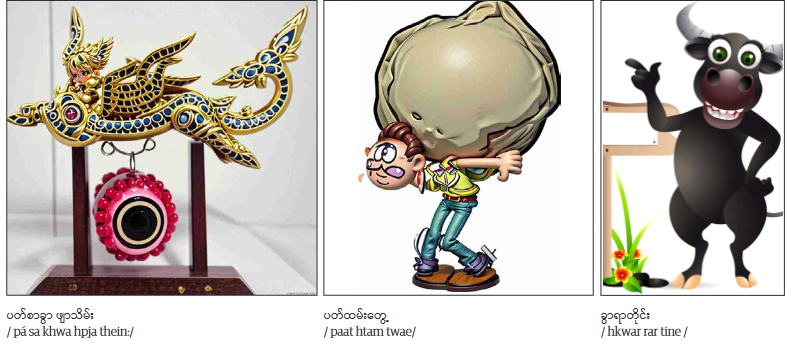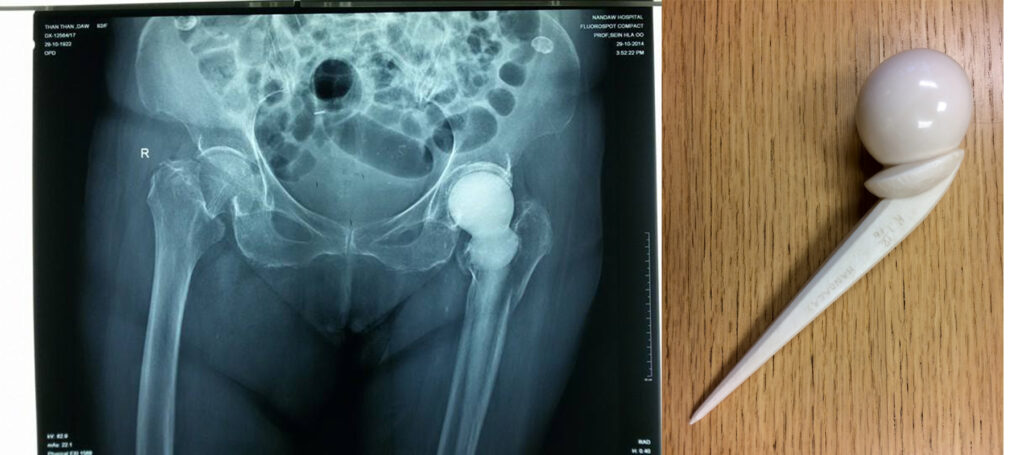Connecting on the Universal Dance of Words
Posted_Date
Image

Body
KNOWING idioms is useful in everyday conversation to sound more fluent and natural, as they can convey complex ideas briefly and add a layer of cultural richness to your language, making interactions more engaging and relatable.
ပတ်စာခွာ ဖျာသိမ်း
/ pá sa khwa hpja thein:/
• to the very end.
• to complete a task thoroughly.
• to fully accomplish a task.
• ပြီးဆုံးသည်အထိ ဆောင်ရွက်သည်။
• မြန်မာ့ဇာတ်ပွဲအဆုံးတွင် ဗုံများကို ချိန်ညှိရာတွင် အသုံးပြုသော ပတ်စာကို ခွာထုတ်ရ...ပရိသတ်သုံးတဲ့ ဖျာတွေကိုလည်း လိပ်ရ...
• အလှူအိမ်မှာ ပတ်စာခွာဖျာသိမ်း လုပ်နေ၍ အိမ်သို့ ဒေါ်ကြီး ပြန်မရောက်သေးပါ။
To Detach the Paste from the Drum and to Roll Up the Mat
At the conclusion of a Myanmar theatrical performance, it is necessary to detach the paste used for tuning the drums and to roll up the mats used by the audience.
Therefore, to finish a task completely is referred to as “detaching the paste from the drum and rolling up the mats.”
This Myanmar idiom embodies the importance of completion and closure in any endeavour. When a theatrical performance concludes, it is symbolic of wrapping up the event and signifies that all tasks related to it have been finalized.
This action reflects a broader life lesson about the significance of seeing things through to the end. Whether in work, relationships, or personal projects, completion ensures that nothing lingers or remains unresolved.
The metaphor invokes an imagery of tidiness and responsibility, suggesting that once a commitment is fulfilled, one should take the necessary steps to tidy up and move on to the next chapter. Thus, it underscores the value of closure and the need to complete what has been started.
USAGES:
“Close the book”
Meaning: To end or finish a discussion or activity.
Example: After a long meeting, we decided to close the book on the project.
“Bring it to a close”
Meaning: To conclude something decisively.
Example: It’s time to bring this discussion to a close.
“Tie up loose ends”
Meaning: To complete any remaining tasks.
Example: Before going on vacation, I need to tie up all loose ends at work.
“Put a finishing touch on it”
Meaning: To add the last detail or improvement.
Example: I just need to put a finishing touch on my painting before I show it.
“Wrap it up”
Meaning: To finish or conclude something.
Example: Let’s wrap it up before we run out of time.
“Cross the T’s and dot the I’s”
Meaning: To finish with attention to detail.
Example: Before submitting the report, make sure to cross the T’s and dot the I’s.
“Call it a day”
Meaning: To finish working for the day or to conclude an activity.
Example: It was a long day, so let’s call it a day.
ပတ်ထမ်းတွေ့
/ paat htam twae/
• တစ်စုံတစ်ခုသော အကျိုးကိုမျှော်မှန်း၍ ညောင်ရေပွဲကိုနွှဲရာမှ ပတ်မကြီးဝင်ထမ်းရသကဲ့သို့ အကျိုးတစ်စုံတစ်ရာရမည်ဟု မျှော်မှန်း၍ ပါဝင် ဆောင်ရွက်ခါမှ ထင်သလိုဖြစ်မလာဘဲ အဆိုးနှင့် ကြုံရသည်။
To Undergo a Queer Punishment of Shouldering a Big Drum
In a fable, a clever judge commanded both the plaintiff and the accused in a defamation case to go around with a large drum hung from a long pole, which they had to shoulder together. Inside the drum was a man instructed to eavesdrop on their conversation.
Thus, to suffer for one’s intervention in a matter, despite having good intentions, is referred to as “undergoing a queer punishment of shouldering a big drum.”
This idiom conveys the irony of becoming entangled in a situation despite intending to provide help or resolution. The fable illustrates how even good intentions can lead to unintended consequences.
The image of shouldering a cumbersome drum emphasizes the burden one bears as a result of meddling or intervening in conflicts that may not directly involve them.
This serves as a warning against overstepping boundaries; the act of eavesdropping and holding the drum becomes a cumbersome, shared punishment, illustrating that good intentions do not always lead to positive outcomes.
Ultimately, it captures the idea that sometimes, it’s better to remain uninvolved rather than bear the unnecessary weight of others’ issues.
USAGES:
“Caught in the crossfire”
Meaning: To become involved in a conflict between two other parties.
Example: She didn’t mean to take sides; she just got caught in the crossfire.
“Burnt by the fire”
Meaning: To suffer negative consequences due to one’s actions or involvement.
Example: He was burnt by the fire when he tried to help them with their problems.
“Too close for comfort”
Meaning: To be entangled in a situation that feels risky or uncomfortable.
Example: Their arguments got too close for comfort, and I had to leave the room.
“Stepping on toes”
Meaning: To interfere in someone else’s affairs or enter their territory.
Example: I didn’t want to step on any toes, but I felt the need to intervene.
“Biting off more than you can chew”
Meaning: To take on too much responsibility or involvement.
Example: He bit off more than he could chew by trying to resolve everyone’s problems.
“A double-edged sword”
Meaning: An action that can yield both positive and negative consequences.
Example: His good intentions were a double-edged sword, creating more complications.
“Playing with fire”
Meaning: To engage in risky or dangerous behaviour that may lead to trouble.
Example: Trying to mediate their argument felt like playing with fire.
ခွာရာတိုင်း
/ hkwar rar tine /
• To compare hoof marks
• To analyze hoof prints
• To examine hoof impressions
When a small buffalo intends to confront a giant buffalo, it examines its own hoof marks in comparison to those of the larger animal.
This allows it to assess its size and strength to determine if it can engage in a competition. Similarly, a person who wishes to break away from their superior is metaphorically said to be comparing their own footprints with those of their superiors.
The idiom “to compare hoof marks” originates from a scenario where a smaller buffalo weighs the risk of confronting a more powerful opponent.
This scenario highlights a universal theme of self-assessment and caution when challenging authority or attempting to elevate one’s status. Individuals often find themselves evaluating their skills, resources, or status against those of others before making significant decisions.
This notion of self-evaluation can apply to various contexts, such as workplace dynamics, personal relationships, or social hierarchies, where one must be mindful of their position before challenging or leaving a situation that entails higher authority or greater experience.
USAGES:
“Know your place”
Definition: Recognize your role within a hierarchy or social context.
Example: It’s important to remember to know your place in the company before critiquing the manager.
“Don’t bite off more than you can chew”
Definition: Avoid taking on a task that exceeds your capabilities.
Example: She wanted to tackle the whole project by herself, but her friend cautioned her not to bite off more than she could chew.
“Cut your coat according to your cloth”
Definition: Live within your means and act according to your resources.
Example: He dreams of driving luxury cars, but he should cut his coat according to his cloth and opt for something more budget-friendly.
“Don’t throw stones if you live in a glass house”
Definition: Refrain from criticizing others if you’re susceptible to similar faults.
Example: He has no right to complain about her actions; after all, don’t throw stones if you live in a glass house.
“Go back to the drawing board”
Definition: Restart a project because the current approach has not worked.
Example: After receiving critical feedback on her proposal, she realized it was time to go back to the drawing board.
“Face the music”
Definition: Confront the consequences of your actions.
Example: After sneaking out last night, he had to face the music when his parents discovered the truth.
“Don’t put the cart before the horse”
Definition: Avoid mixing up priorities or doing things in the wrong order.
Example: We should finalize a business plan before seeking funding; let’s not put the cart before the horse.
“Call it a day”
Meaning: To conclude your work or activity for the day.
Example: It’s been a long day, so let’s call it a day.
Source- The Global New Light of Myanmar






